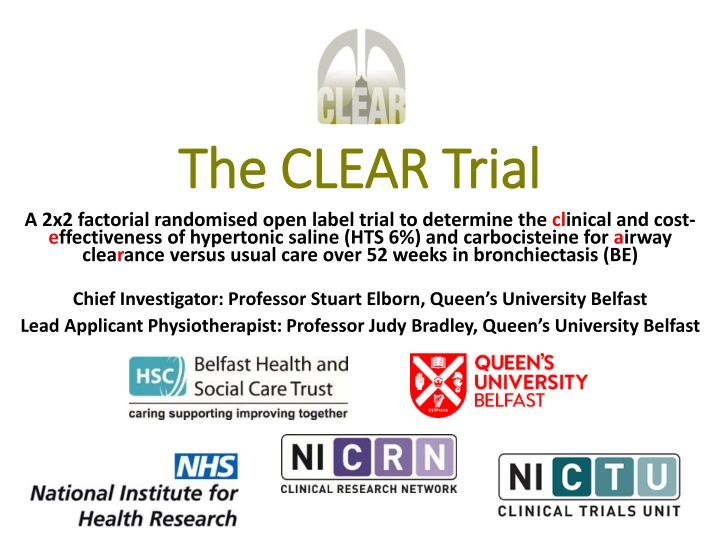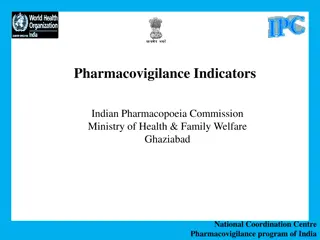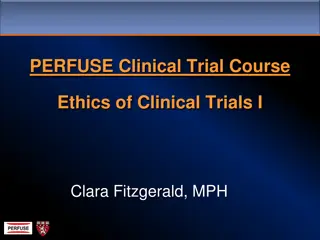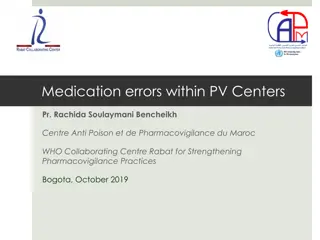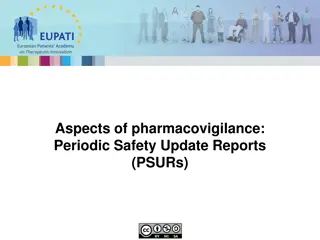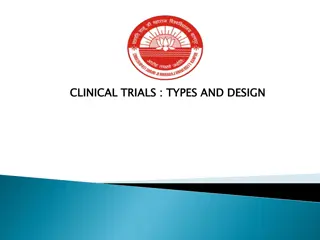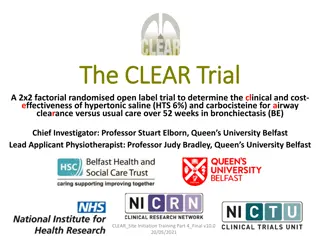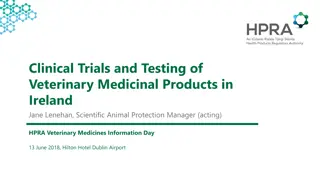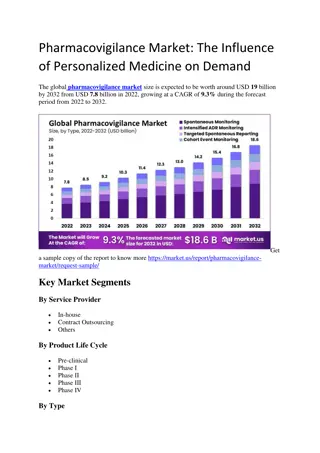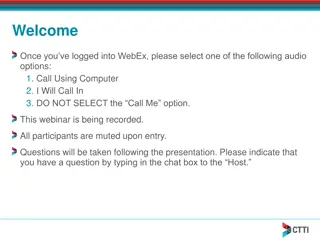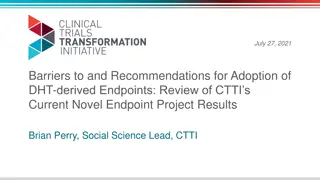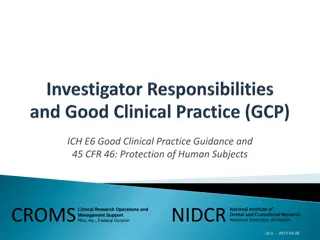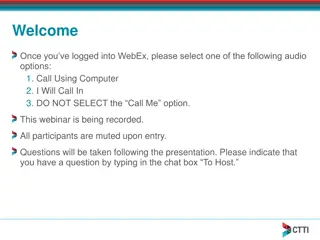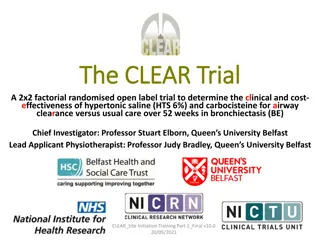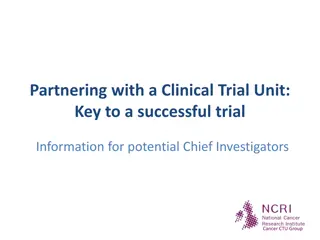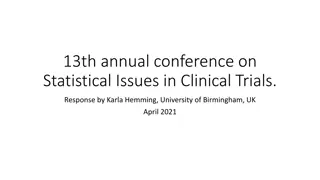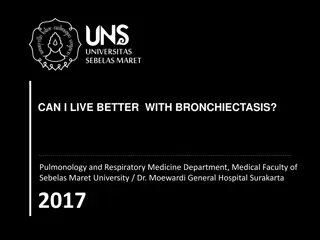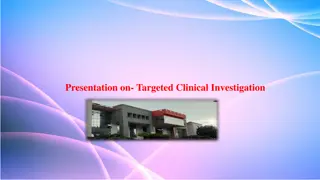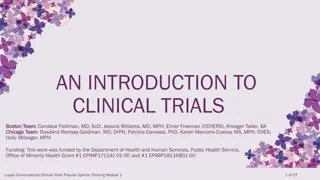Pharmacovigilance Guidelines for Clinical Trials in Bronchiectasis Research
The CLEAR Trial is a 2x2 factorial randomized trial evaluating the effectiveness of hypertonic saline and carbocisteine for airway clearance in bronchiectasis patients. The trial, led by Professor Stuart Elborn and Professor Judy Bradley, focuses on pharmacovigilance activities, adverse event definitions, and severity assessments. Adverse events must be recorded and reported accurately, with assessments of severity categorized as mild, moderate, or severe.
Download Presentation

Please find below an Image/Link to download the presentation.
The content on the website is provided AS IS for your information and personal use only. It may not be sold, licensed, or shared on other websites without obtaining consent from the author.If you encounter any issues during the download, it is possible that the publisher has removed the file from their server.
You are allowed to download the files provided on this website for personal or commercial use, subject to the condition that they are used lawfully. All files are the property of their respective owners.
The content on the website is provided AS IS for your information and personal use only. It may not be sold, licensed, or shared on other websites without obtaining consent from the author.
E N D
Presentation Transcript
The CLEAR The CLEAR Trial A 2x2 factorial randomised open label trial to determine the clinical and cost- effectiveness of hypertonic saline (HTS 6%) and carbocisteine for airway clearance versus usual care over 52 weeks in bronchiectasis (BE) Trial Chief Investigator: Professor Stuart Elborn, Queen s University Belfast Lead Applicant Physiotherapist: Professor Judy Bradley, Queen s University Belfast
Site Initiation Training Part 2: Site Initiation Training Part 2: Pharmacovigilance, Pharmacovigilance, Monitoring and Documentation Monitoring and Documentation - - CTU CTU Pharmacovigilance Study Monitoring Source Documents Trial Committees NICTU SOP - Investigator Site File Archiving Study Document Completion Trial Supplies
Pharmacovigilance Pharmacovigilance Pharmacovigilance activities for CLEAR delegated to NICTU by Sponsor NICTU SOP TM03 Recording & Reporting of Adverse Events, Serious Adverse Events & Urgent Safety Measures SOP applies to PI and staff responsible for Adverse Event reporting Documentation of SOP training required for all staff delegated AE/SAE reporting (Task 12) on the Delegation Log
Pharmacovigilance Pharmacovigilance Adverse Event (AE) Definition Any untoward medical occurrence in a patient or clinical trial subject administered a medicinal product and which does not necessarily have a causal relationship with this treatment All observed & spontaneously reported AEs will be recorded Signs & symptoms of exacerbations collected as outcomes will not be reported as AEs However, if a patient experiences an exacerbation between the period of consent and randomisation this should be recorded and reported as an AE - e.g. during 4 week washout period Patient will be asked about AEs at each visit All AEs should be recorded in the patient s medical notes and on the AE form in the CRF CLEAR AE reporting begins upon consent & ends 30 days after the last administration of the study drug PI or designee must assess all AEs for Severity, Seriousness & Causality
Assessment of AEs Assessment of AEs Severity Assessment of the intensity of the event: Mild (easily tolerated, causing minimal discomfort and not interfering with everyday activities) Moderate (sufficiently discomforting to interfere with normal everyday activities) Severe (prevents normal everyday activities) Life Threatening (life threatening consequences; urgent intervention indicated) Death (results in death)
Assessment of AEs Assessment of AEs Seriousness Assessment of whether an AE: Results in death: all deaths occurring from enrolment until 30 days of the last administration of the study agent must be treated as a SAE and reported as such Is life threatening an event in which the patient was at risk of death at the time of the event Requires hospitalisation or prolongation of existing hospitalisation an inpatient admission, regardless of length of stay or if overnight and even if a precautionary measure for continued observation hospitalisation (including for an elective procedure) for a pre-existing condition (prior to study entry) which has not worsened is not an SAE Results in persistent or significant disability or incapacity Consists of a congenital anomaly or birth defect Any other important medical event that carries a real risk of one of the outcomes above
Assessment of AEs Assessment of AEs Causality Assessment of the extent to which it is believed the AE may be related to the study drug: Not Related Temporal relationship of the onset of the event relative to administration of the product, is not reasonable or another cause by itself can explain the event Unlikely Temporal relationship of the onset of the event relative to administration of the product, is likely to have another cause which by itself can explain the event Possibly* Temporal relationship of the onset of the event relative to administration of the product, is reasonable but the event could have been due to another, equally likely cause Probably* Temporal relationship of the onset of the event relative to administration of the product, is reasonable and the event is more likely explained by the product than another cause Definitely* Temporal relationship of the onset of the event relative to administration of the product, is reasonable and there is no other cause to explain the event
Assessment of AEs Assessment of AEs Expectedness Where an event is assessed as possibly, probably or definitely related, the event is an Adverse Reaction (AR) ARs are assessed as Expected or Unexpected based on the information in the Reference Safety Information: Expected: AR is consistent with the toxicity of the IMP listed in the RSI Unexpected: AR is not consistent with the toxicity of the IMP listed in the RSI An AR may be unexpected if it has occurred with a greater frequency or severity than expected CLEAR Trial Reference Safety Information Carbocisteine (regardless of brand): Mucodyne Summary of Product Characteristics (Section 4.8 Undesirable effects) Hypertonic Saline 6%: MucoClear Patient leaflet (Side effects Section)
SAE Reporting SAE Reporting AEs assessed as meeting any of the criteria for seriousness require expedited reporting Serious Adverse Events (SAEs) will be reported using the SAE form which must be submitted to CTU within 24 hours of becoming aware of the event. The SAE Form should be emailed to the CTU: clinical.trials@nictu.hscni.net Do not wait until all information about the event is available before notifying the CTU of the SAE Any follow-up information not available at the time of the initial report should be submitted as it becomes available
SAE Reporting SAE Reporting Suspected Unexpected Serious Adverse Reactions (SUSARs) are SAEs that are considered to be related to the IMP and are unexpected i.e. their nature or severity is not consistent with the RSI The CTU is responsible for reporting SUSARS to the Sponsor & Ethics Committee. Sponsor will report SUSARs to the MHRA as per regulatory requirements A fatal or life threatening SUSAR must be reported within 7 days of the first knowledge of such an event (follow up info within 8 days) All other SUSARS must be reported to REC and MHRA within 15days if the first knowledge of such an event
Other Safety Reporting Other Safety Reporting Urgent Safety Measures If the PI or designee becomes aware of information that means that a change in a study procedure is necessary to protect a patient from an immediate hazard, they can implement this immediately without prior approval from REC or MHRA. The PI or designee should then immediately phone the clinical trials unit at the MHRA and discuss with a medical assessor They should also report the urgent safety measure to the CTU within 1 working day who will notify the sponsor Pregnancy Reporting Pregnancy is not an AE or SAE but an abnormal outcome is, therefore, if applicable pregnancy information should be collected from enrolment until 30 days post the last administration of study drug In the event of a pregnancy the PI or designee should complete and submit the Pregnancy Reporting Form to the CTU by email within 14 days of being made aware of the pregnancy and follow-up until outcome.
Monitoring Monitoring To ensure: the rights, safety and well being of the trial participants are protected the reported trial data are accurate, complete and verifiable from source documents the trial is in compliance with the approved protocol, GCP and applicable regulatory requirements First interim visit will occur within 6 months of the randomisation of the first patient Further monitoring visits will take place annually thereafter, approximately every 12 months from the date of the first visit A close-out visit will be arranged at each site once the final patient recruited at the site has completed all follow-up
Monitoring Visits Monitoring Visits Visits will involve: Review of the Investigator Site File Review consent forms & check eligibility Review data entered into the MACRO clinical database and complete source data verification (SDV) Please have all source documents available Please ensure a team member is available to deal with queries PI should be available at the end of the visit for a feedback meeting Please be advised that due to the COVID-19 pandemic, remote monitoring visits may have to be arranged instead of an onsite visit.
Source Documents Source Documents PI agrees to provide access to source documents for trial-related monitoring or audits/inspections Source documents for CLEAR Patient Medical Notes Source Workbooks Informed Consent Forms Prescriptions Spirometry Results PDF Files: Download/Printout Patient Questionnaires The location of source data will be confirmed with each site, and recorded on a Source Data Location list.
Trial Committees Trial Committees Trial Steering Committee Professor Andy Jones (Chair) Professor Graham Devereux Dr Rosina Ledermuller Professor Stuart Elborn Dr Una Jones Professor Barry Plant Professor Patrick Flume Mrs Fiona Copeland Professor Judy Bradley Dr Robert Rutherford Aidan Kearney Trial Management Group Professor Stuart Elborn Professor Judy Bradley Andrew Jackson Rachael McQuillan Olive McAleese Clare Adair Christina Campbell Sorcha Toase Ashley Agus Joanne Thompson Patricia Rafferty Margaret McFarland Data Monitoring and Ethics Committee Professor Stefano Aliberti (Chair) Dr Ian Bradbury Professor Scott Bell
Investigator Site File (ISF) Investigator Site File (ISF) Trial Master File (TMF) holds all essential documents Inspections or Audits of the TMF are used confirm compliance with regulatory requirements The Investigator Site File (ISF) at each site is a key section of the TMF NICTU has been delegated TMF set-up & maintenance by the Sponsor, therefore, the ISF must be set-up according to NICTU SOP TM02: ISF and Essential Documents PI is ultimately responsible for the set up and maintenance of all essential documents in the ISF but may delegate (Task 17) to a member of the research team who has documented SOP training
Investigator Site File (ISF) Investigator Site File (ISF) As each site is initiated an ISF will be provided to the PI Must be retained within a secure location with restricted access All documents should legible and accurate and signed and date as appropriate Contains all essential documents, logs and forms for trial Maintained and a kept up to date on an on-going basis throughout the trial Previous versions of essential documents i.e. protocol should be marked as superseded All filing done in a timely manner and filed chronologically within each section Must be available for monitoring visits for audits Once the trial is finished the PI is responsible for reviewing to ensure all essential documents are present Once close out activities completed the ISF can be archived
ISF Index ISF Index Index at the beginning of the file outlines the documents to be retained in the file and where these should be held Intended as a guide. If a document is not applicable to the CLEAR trial this should be noted on the index Where a document is applicable but is filed elsewhere a file note should be added to the applicable section e.g. pharmacy documents
Archiving Archiving The PI is responsible for archiving essential documents at the study site Unless otherwise directed ensure that all study records are archived appropriately on conclusion of the study and retained for 5 years Patient medical files should be retained for 15 years
Study Study Document Completion Document Completion SWAT: Thank you letters Study Logs Log for Protocol Training- All staff to go on Delegation Log (including Pharmacy staff) NICTU SOP Training Logs: AE/SAE reporting All staff to be delegated Task 12 on Delegation Log ISF All staff to be delegated Task 17 on Delegation Log Delegation Log PARI Training Log DRA Competency Document CVs (copies of wet-ink signed and dated within 1 year) and GCP Certs - all staff to go on Delegation Log Please Note: If a member of the team leaves the study, please ensure they sign off the delegation log & that the updated log is forwarded to CTU. o If you need copies of any trial documentation please contact the NICTU
